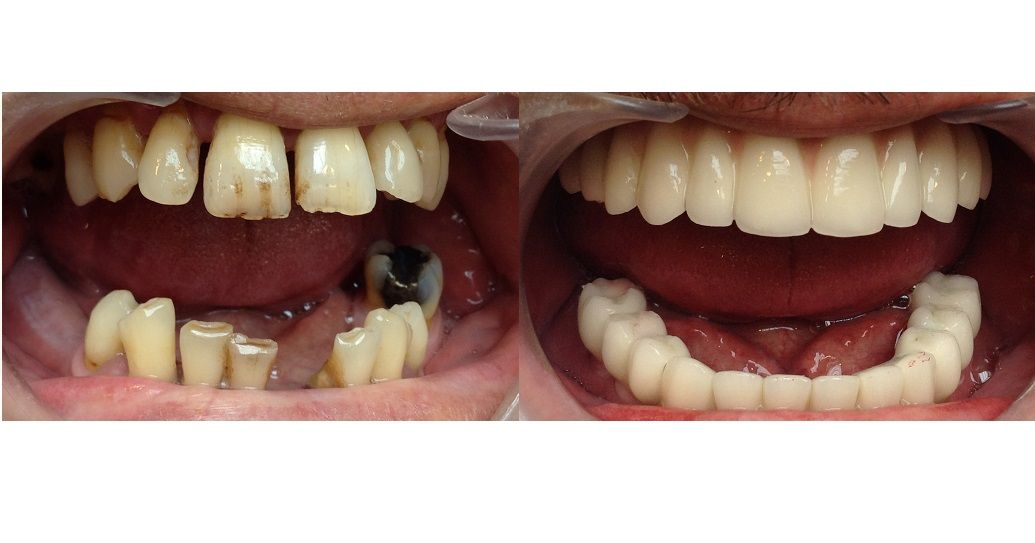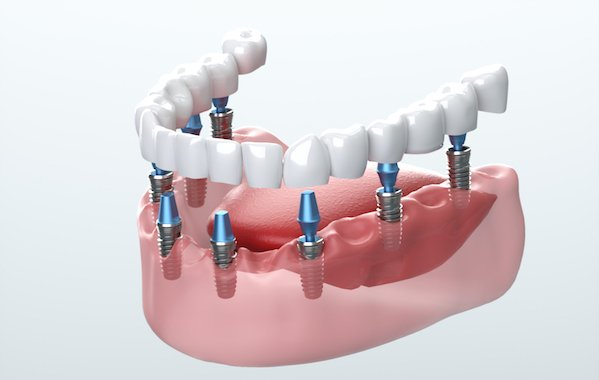Dental Implant Costs: A Complete Breakdown
Dental Implant Costs: A Complete Breakdown

Dental Implant Costs: A Complete Breakdown
If you're considering dental implants, one of the first questions that comes to mind is likely "how much do dental implants cost?"
The prices can vary quite a bit depending on your specific needs. I'll walk you through the key factors that influence the cost of dental implants so you can understand what goes into pricing.
What Are Dental Implants?
But first, let's start with an overview of what dental implants are for those who may be unfamiliar.
Dental implants are replacement tooth roots made of biocompatible titanium that are surgically inserted into the jawbone. The titanium implant fuses to the jawbone through a process called osseointegration. This creates a strong, stable foundation to anchor a replacement crown, bridge, or denture.
Once placed, dental implants look, feel, and function just like natural teeth. They allow you to eat, speak, and smile with confidence again after tooth loss. Implants help preserve your facial structure and prevent bone loss in the jaw, which can happen after losing teeth.
Many patients choose dental implants over other tooth replacement options like bridges and dentures. Implants come with unique benefits:
- They are durable and can last for decades with proper dental care.
- Implants do not require altering healthy neighboring teeth like bridges do.
- The stability of implants allows for more natural chewing and eating.
- Implants are comfortable and feel like natural teeth.
- They effectively restore facial aesthetics with a beautiful smile.
Now that we've reviewed the purpose and advantages of dental implants, let's explore the biggest factors that impact the costs.
Key Factors That Determine Dental Implant Costs
The cost of your dental implant treatment depends on several variables specific to your case, including:
- The number of implants needed
- Location of the implants in your mouth
- Restoration type like crowns, bridges, or dentures
- Dental specialist vs. general dentist
- Geographic location of the dental practice
- Bone grafting or sinus lift requirements
- Type of implant material like titanium or zirconia
I'll go over each of these key factors in more detail below. Getting familiar with them will help you gain a better understanding of the pricing.
How the Number of Implants Affects Cost
One of the biggest factors determining your total dental implant cost is the number of implants required.
Each implant that must be surgically placed costs money in both materials and procedural fees. One single implant may cost £1200-£3000 on average. If you need several implants, like a full arch of replacements, the total can exceed £25,000.
The number of implants needed depends on:
- How many individual teeth need to be replaced
- The size of the gap being restored
- Proper distribution of chewing forces
Typically, larger spaces need more implants to evenly distribute biting and chewing pressure. Your dentist will determine the ideal number of implants for your unique case.
Implant Location Matters
Where the implants are needed in your mouth impacts the cost. Front teeth are simpler to extract and replace with implants. Back molars are more complex for a few reasons:
- The bone may be less dense and require building up with bone grafts.
- The nearby sinus cavity may need a sinus lift procedure to add bone.
- The forces of biting and chewing are greater in the back.
These additional procedures to accommodate the sinus and increase bone density add cost through extra surgical time, materials, and healing time before placing the implant.
Restoration Options After Implants
The implant itself is just the first component of tooth replacement. After the implant fuses to the bone, it needs a visible tooth-like crown attached to complete the restoration.
More complex restorations like bridges and dentures with multiple replacement teeth often cost more in both labor and material expenses compared to a single crown.
Some common restoration options include:
- Crown - An individual cap that replaces one missing tooth.
- Bridge - Bridges gaps from multiple lost adjacent teeth.
- Removable partial denture - Replaces several missing teeth with a removable partial.
- Full bridges - Replaces all lost teeth in the upper or lower arch.
The parts all add up to influence the overall price of implant treatment.
Dental Specialist vs. General Dentist Pricing
The experience and training of your dentist makes a significant difference in the cost of dental implants.
Specialist implant dentists have advanced skills and expertise specifically in implant procedures. However, their fees are typically higher than general dentists who place implants.
General dentists charge less for implants, but also have lower success rates overall. They may refer you to a specialist for parts of treatment beyond their scope.
When budgeting for the cost of dental implants, the experience level of the clinician is an important consideration. An implant specialist may cost more, but also deliver higher quality results.
Geographic Location Affects Cost
The cost of dental implants can vary somewhat based on geographic location. However, it is difficult to generalize that prices are always higher in metropolitan vs. rural areas. Location is just one potential factor in pricing.
The most important considerations are finding an experienced implant dentist, getting a detailed treatment plan, and asking questions to understand all costs involved. Be sure to get multiple quotes to compare pricing across different providers in your area.
The key is not to make assumptions about costs based on location alone. Do your research to find affordable quality care through consultations and comparing total cost estimates. The right dental office for implants may not always be the one closest to home.
Some patients choose dental tourism for large savings on implants by combining treatment with an overseas vacation. This allows quality implant treatment at a fraction of the cost compared to prices in other countries.
Bone Grafting or Sinus Lift Needs
If your jawbone density is low, your dentist may recommend a bone graft before placing the implant. This adds bone to provide sufficient support.
A sinus lift is another pre-implant procedure to add bone beneath the sinus cavity for implants in the upper back teeth region.
The need for these extra bone augmentation procedures can add cost to the overall treatment plan. But they're often necessary to ensure the long-term success of your implants.
Types of Implant Materials
The most common implant material is titanium due to its strength, durability, and biocompatibility. However, other options like zirconia or ceramic implants are also available.
These ceramic implants provide a metal-free choice for patients concerned about metal sensitivity or allergies. They are typically more expensive than standard titanium.
Talk to your dentist about the best implant material choice for your dental needs and sensitivities.
Estimating Your Total Implant Costs
With all those factors that can influence price, most patients want to know - what is the total cost for dental implants?
Unfortunately, there is no universal price for implants. The costs are too variable and patient-specific. The best way to estimate your total costs is to:
- Have an in-depth exam and consultation with your dentist
- Get a 3D x-ray like a CT scan to fully assess bone condition
- Obtain a comprehensive treatment plan outlining every procedure, equipment and material involved
- Request a written estimate of the total costs once your dentist can visualize your unique treatment needs
This gives you the most accurate cost estimate based on your specific implant case. Cost transparency and understanding the breakdown of fees helps you plan and budget for implants.
Making Dental Implants More Affordable
Dental implants may seem expensive, but there are ways to make this valuable dental treatment more budget-friendly:
- Ask your dentist if they offer any discounts on implant packages or financing options. Many offer payment plans to spread out the costs.
- Shop around to compare pricing between dentists and dental clinics in your area.
- Take advantage of dental tourism for significant savings on quality implants overseas.
- Get pre-approval from your dental insurance to see exactly what's covered. Most plans only cover a portion of the total costs.
- Consider applying for third-party financing like CareCredit or Springstone to pay over time.
- Time your treatment to make the most of your annual insurance limits.
- Contact local dental schools to ask about reduced costs for students to perform implant procedures.
With the right financial planning, high-quality dental implants can be an accessible and affordable option to restore your oral health and smile.
Are Dental Implants Worth the Investment?
For many patients, dental implants are absolutely worth the investment despite the potentially high up-front costs. Here's why:
- Highly skilled dentists can achieve natural looking and feeling implant teeth.
- Well-cared for implants can last for decades, longer than other restoration options.
- Implants prevent bone loss in the jaw that occurs after losing natural teeth.
- They allow you to eat and chew without restrictions.
- Implants can restore facial aesthetics and the confidence of a beautiful smile.
- No need to alter healthy adjacent teeth like bridges require.
- Dental function and quality of life improve tremendously.
Considering these excellent benefits and long-term value, dental implants are a worthwhile investment for your oral health and smile restoration.
Key Takeaways on Dental Implant Costs
To summarize the key points:
- Many factors affect the total cost from number of implants to location and materials.
- Get a written treatment plan and estimate from your dentist before starting.
- Complex restorations like bridges often cost more than single crowns.
- Specialists have higher fees but provide quality results.
- Bone grafting or sinus lift procedures can add cost when needed.
- Make implants affordable with insurance, discounts, payment plans, and dental tourism.
- Although expensive initially, implants provide lasting value and benefits for your smile.
I hope this breakdown gives you a better understanding of what impacts the price of dental implants. Talk to your dentist to discuss your specific treatment needs and get an accurate cost estimate. Investing in implants is investing in your confidence and quality of life for the long-term.
Dental Implant Costs: Frequently Asked Questions
How can I spread the cost of dental implant treatment?
Many dental clinics offer payment plans or financing options to help spread the cost over time. We also accept most major credit cards. Discuss payment with us.
What is included in the breakdown of dental implant costs?
The total costs include the implant itself, abutment and crown fabrication, any grafting procedures, x-rays, anesthesia, and follow-up visits. We provide a detailed cost breakdown.
How much does an implant crown cost?
The cost of a custom crown over the implant is typically $500-$1500 depending on materials. We offer affordable zirconia crowns.
What factors affect the cost of implant placement?
The main factors are bone condition, location in the mouth, specialist vs general dentist, type of implant, and number needed.
Why choose an experienced implant dentistry clinic?
Our dentists specialize exclusively in implant dentistry. Their expertise and advanced training results in excellent outcomes.
Do you offer free implant consultations?
Yes, we offer complimentary dental implant consultations to determine your needs and options. We also provide free second opinions.
What is involved in dental implant surgery?
Our oral surgeon will place the titanium implant screw into your jawbone. The site is stitched closed and given several months to fully fuse to the bone before attaching the abutment and crown.
How long do dental implants last?
With proper dental care and maintenance, implants have over a 95% success rate and can last decades. Some have functioned well for over 40 years.
Can I get dental implants on the NHS?
NHS dental implant coverage is very limited. We offer affordable payment plans so cost doesn't prohibit this worthwhile investment in your smile.
Are dental implants suitable if I have had a tooth removed or root canal?
Implants are great options for replacing extracted or endodontically treated teeth. We can place the implant after complete healing.
How can I find out the cost of my dental implant treatment?
The exact cost depends on your unique case. We provide personalized quotes after a thorough exam, x-rays, and treatment planning. Contact us to learn more.


